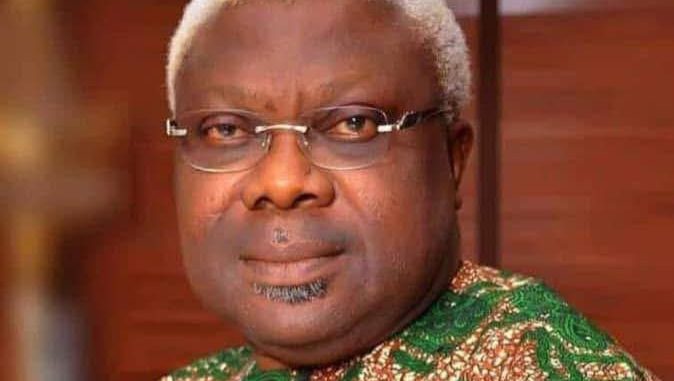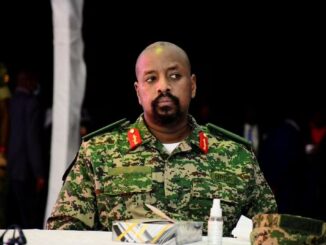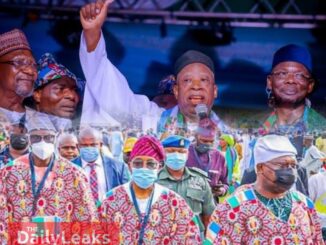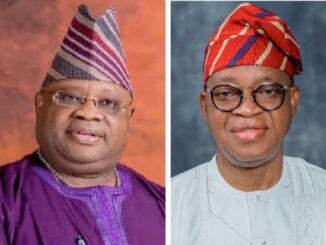
By Seyi Gesinde
November 15, 2025
If Osun needs a governor who can merge head and heart, hard technical competence with the rare ability to stitch coalitions across fierce divides, then Dr Iyiola Ajani Omisore fits the brief. An engineer by training, a strategist by temperament, and a vote-getter with deep roots from Ile-Ife in Osun State, he is one of the few contemporary politicians who has proven he can win contests, manage numbers, and still keep doors open to rivals when the state’s stability is on the line.
A grounded son of Osun with national reach
Born into the Ile-Ife royal lineage, Omisore’s story begins in Osun’s cultural capital and stretches to Abuja and beyond. That heritage has always underwritten his “street acceptability,” he is not a visitor to the terrain, but his profile is decisively national: Osun State deputy governor (1999–2003), two-term senator for Osun East (2003–2011), Senate Appropriations Committee leader, and later National Secretary of the All Progressives Congress (APC). Each role widened his network across parties, business, civil service and traditional institutions, assets any governor needs to move projects from file to field.
Engineer first: the rare technocrat-politician
Omisore is not an “engineer” merely by title. He is formally trained in electrical and electronic engineering as well as power systems, holding advanced academic qualifications including a PhD in infrastructure finance from the International School of Management in Paris, an uncommon yet valuable combination for managing today’s financially constrained subnational governments.
His educational journey began at SS Peter and Paul Roman Catholic School in Ile-Ife and continued at St. John Grammar School, Ile-Ife. He pursued further studies at Federal Polytechnic, Owo, Ondo State, then advanced to Technology College in Reading, UK, and Brunel University, Uxbridge, where he earned engineering degrees and a postgraduate certificate. This unique blend of technical engineering knowledge and financial acumen positions him well to address complex infrastructure development challenges.
Esteemed in professional circles as a hands-on technocrat, Omisore is a member of the Nigerian Society of Engineers (NSE) and a fellow of the Institution of Mechanical Engineers, England and Wales. He engages actively in national engineering forums and was recently appointed by the Council for the Regulation of Engineering in Nigeria (COREN) to chair its Task Force Committee on the Engineering Residency Programme (ERP), a critical initiative for equipping young graduates with practical industry skills. His leadership in this role underscores his enduring relevance and respected status in the engineering profession.
ALSO READ: APC: Omisore and the shape of things to come
Before entering politics, Omisore built a robust career managing complex projects across sectors such as airfields, hospitals, mills, and rural electrification. Initially working for major firms, he later established his own ventures. His governance should be measured by tangible achievements, not rhetoric; few rivals can claim a technical track record as deep as his.
A vote-getter with staying power, and the power of negotiation
Numbers tell their own story. In a series of high-stakes contests, Omisore has repeatedly attracted cross-sectional support across Osun’s 30 local government areas, proving that his political capital rests on relationships and performance as much as party label.
In 2014, running on the PDP ticket, he polled 292,747 votes against an incumbent—clear evidence of broad acceptability. Four years later, in 2018, after single-handedly resuscitating the Social Democratic Party (SDP) barely months before the polls, he drove the party to an unprecedented statewide presence. In record time, the SDP became a viable third force, carrying 128,053 votes—enough to deny both major parties an outright win and force the governorship contest into a rerun. Analysts across the aisle agreed: transforming a near-moribund party into a spoiler-turned-kingmaker within months is a feat that speaks of deep grassroots trust, message discipline and unrivalled field organisation.
When the 2018 governorship election tipped into that inconclusive stalemate, all eyes turned to Omisore. Holding the balance, he demonstrated rare coalition sense: opening dialogue, extracting issue-based commitments on governance priorities, and ultimately endorsing the APC. That carefully brokered alliance delivered the decisive votes which enabled the party to secure Osun, averting a prolonged political crisis and confirming him as a strategist who values stability above partisanship. Commentators later described the moment as proof that “Omisore does not just contest elections—he defines their outcome.”
The bridge-builder who can calm hot contests
Osun’s elections have often been finely balanced affairs. Where others hardened positions, Omisore showed skill in negotiation: knowing when to ally, when to stand down, and how to extract issue-based commitments that protect the public interest. That temperament, practical, patient, strategic, is precisely the quality a governor needs to keep Osun governable when contests get overheated.
Appropriations chairmanship: fluency with budgets and the numbers that matter
As Senate Appropriations leader, Omisore perfected the skill of translating ambitious goals into realistic budgets. He expertly balanced capital projects and recurring expenses within the Medium-Term Expenditure Framework, skillfully navigating the complex give-and-take among Abuja ministries. This fiscal expertise was crucial for a state like Osun, heavily dependent on limited federal allocations and internal revenue where every budget decision is vital for survival.
Serving in the Senate from 2003 to 2011, Omisore reshaped budget processes into a people-focused, evidence-driven framework. He championed broad consultations with citizens and civil society to ensure budget allocations met genuine needs and prioritized socially impactful projects. Under his leadership, the Appropriations Committee boosted investments in infrastructure, healthcare, education, and economic empowerment. Key projects funded and completed during his tenure included road dualizations, rural electrification, water supply enhancements, and cultural centers.
Omisore’s dedication to transparency and inclusiveness in budget negotiations set a national benchmark for participatory budgeting, aligning federal spending with development objectives. Even after leaving the Senate, he sustained strong connections with policymakers to support and expand these infrastructure initiatives. His work demonstrated not only financial mastery but also a steadfast commitment to practical development outcomes that uplift ordinary citizens and the nation.
This fusion of technical budgetary skill and resolute focus on impactful results distinguishes Omisore as a legislator whose legacy transcends numbers, emphasising tangible progress and fiscal accountability.
Networks that convert to projects
From his spell as the ruling All Progressives Congress (APC) National Secretary to longstanding relationships across the legislature, traditional institutions and the engineering community, Omisore’s contact book is unusually productive. It is one thing to know people; it is another to convert goodwill into counterpart funding, federal projects and private capital for public-private partnerships. His recent appointment by COREN further shows he remains plugged into the institutions that can co-finance Osun’s next build-out while nurturing the next generation of professionals.
What this means for Osun: five deliverables a Governor Omisore can credibly drive
Power and works: Grid extensions, embedded generation for industrial clusters and a maintenance culture designed by someone who’s actually delivered technical projects.
Water and health infrastructure: Pragmatic rehabilitation of reticulation schemes and hospital maintenance through outcome-based contracts.
Budget discipline: Cleaner capital budgeting, project pipeline transparency and cash-flowed execution, skills honed while chairing Appropriations.
Deal-making for development: The capacity to align the centre, private sector and communities, turning political networks into roads, clinics and schools.
Peaceful politics: A proven hand at de-escalating knife-edge contests and keeping all sides talking, vital for social stability and investor confidence.
The intangible edge
Beyond CV items and vote totals lies an intangible: credibility. In a polity starved of demonstrable delivery, the combination of technical competence, professional recognition (including NSE membership), trusted leadership roles such as COREN’s ERP chairmanship, budgetary fluency and a proven knack for coalition politics gives Omisore a credibility-premium few rivals can match. It attracts businesses, reassures civil service managers and calms investors, three groups a new government must win quickly.
The case in one sentence
Competence without connection builds slowly; connection without competence wastes time. Omisore offers both, and Osun can’t afford to choose only one.




